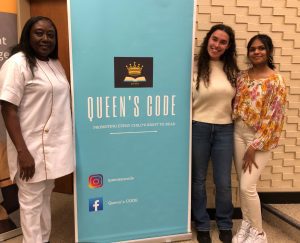
As a university student, it is not often that one is inspired by an optional extracurricular activity. I had the unparalleled opportunity to volunteer with CODE, an organization focused on global development through literacy. Inspired by their mission, I joined Queen’s University’s chapter (QCODE) as Logistics Director in my third year, where I managed event planning. My passion for education and global development led me to take on a larger role as club president in my final year of study.
My passion grew as I learned about the ‘Girls’ Accelerated Learning Initiative (GALI)’, developed by CODE and the WE-CARE Foundation. GALI addresses Liberia’s increasing “over-age” student population by providing after-school tutoring and essential life skills, helping girls advance to ageappropriate grade levels and encouraging them to continue their education. GALI’s innovative, inspiring and dedicated efforts have had a lasting impact on Liberian students and beyond.
This past February, QCODE held a panel event supporting GALI, featuring CODE CEO, Janice Ciavaglia and WE-CARE Foundation’s founder, Yvonne Capehart Weah. In the spirit of literacy and global development, we invited students ranging from faculties of education to global studies and more.
Janice Ciavaglia, a decorated professional in education and advocacy, motivated the room to create change within their own educational spheres. I was personally energized by her achievements and the powerful reforms she’s piloted across the industry. Later, I was moved by Yvonne’s words through her proven advocacy efforts towards the cause. Her impactful presentation on the literacy poverty faced by Liberians, combined with her poignant personal stories, created one of the most dynamic yet stirring educational panels I’ve ever attended as a student.
It was an experience I will always cherish, as it served as a stark reminder of the power of the human spirit and stands as the most influential demonstration of advocacy I’ve personally witnessed. Furthermore, it was an exceptional opportunity for the Queen’s student community to not only become aware but also learn more from a Liberian champion for education. The sheer devotion revealed through her accomplishments and the enacted change she has pioneered in Liberia through her organization was truly inspiring.
Yvonne also shared culturally relevant reading books for children that had been written and illustrated in Liberia, adding another layer to her touching presentation. This allowed me to discover the types of educational materials implemented in Liberia and learn more about the country’s fledgling publishing industry. As someone who hopes to eventually become an author, I found this component of the GALI program especially powerful and relevant.
As a young woman, it was crucial to hear the firsthand experiences of these women. It was also incredibly insightful, offering unique and relevant perspectives on such a poignant topic. As someone with a Canadian undergraduate education, I was deeply confronted with the global educational disparities faced by other students of diverse ages. Yvonne’s words inspired me to explore education-based advocacy opportunities beyond my career in Health Sciences.
I hope to continue my efforts in supporting the GALI program, the WE-CARE Foundation, and future partners with CODE to promote every child’s right to read. I implore all those reading this to learn
more about GALI and engage with Yvonne wherever possible, as I am certain that inspiration will strike you, too, and action will follow.
Natalie Braverman, former Chair of Queen’s University Chapter of CODE (QCODE) September 12, 2024)


